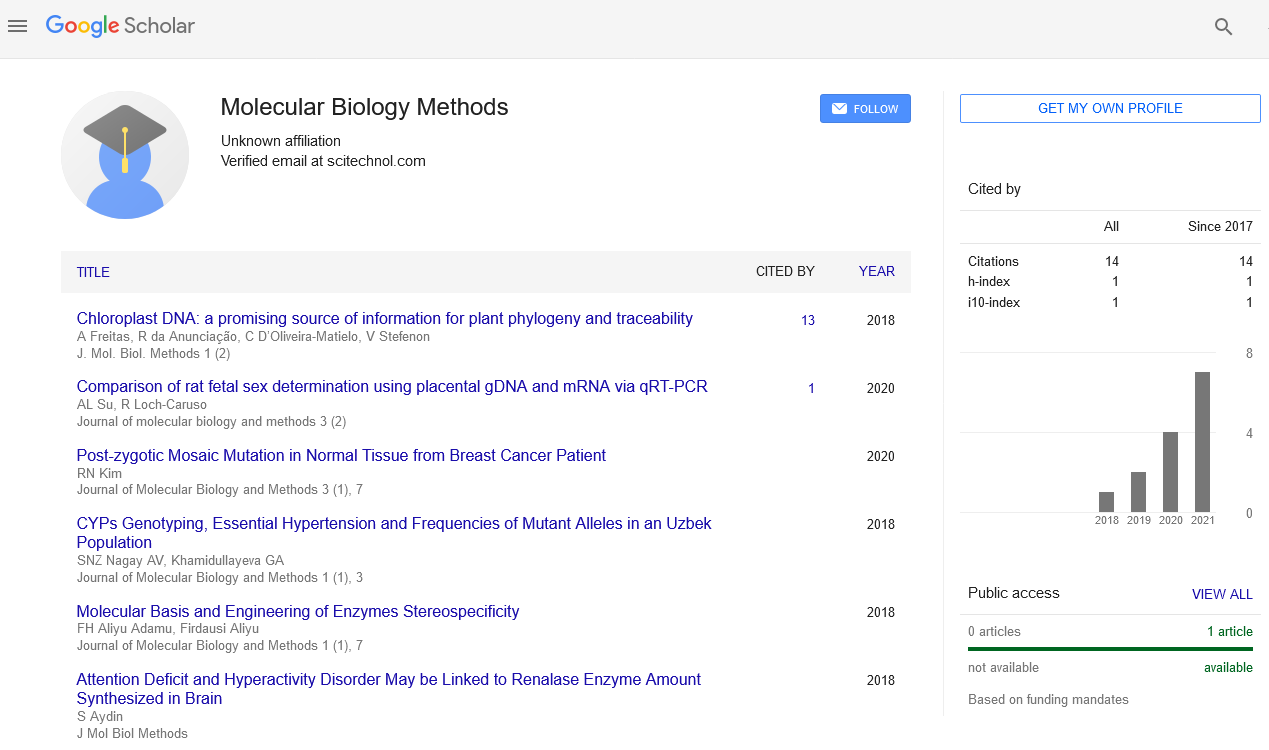Opinion Article, J Mol Biol Methods Vol: 6 Issue: 1
Role of Polymerase Chain Role of Polymerase Chain Reaction in Medical Diagnostics and Disease Detection
Yuan Liu*
1Department of Epidemiology and Biostatics, Peking University, Beijing, China
*Corresponding Author: Yuan Liu
Department of Epidemiology and Biostatics, Peking University, Beijing, China
E-mail: yuanliu@eu.32.cn
Received date: 20 February, 2023, Manuscript No. JMBM-23-92994;
Editor assigned date: 22 February, 2023, PreQC No. JMBM-23-92994 (PQ);
Reviewed date: 09 March, 2023, QC No JMBM-23-92994;
Revised date: 16 March, 2023, Manuscript No. JMBM-23-92994(R);
Published date: 23 March, 2023, DOI: 10.4172/JMBM.1000125
Citation: Liu Y (2023) Role of Polymerase Chain Reaction in Medical Diagnostics and Disease Detection. J Mol Biol Methods 6:1.
Description
Polymerase Chain Reaction (PCR) is a molecular biology technique that has revolutionized the field of genetics and enabled many breakthroughs in the medical field. The PCR process involves three key steps denaturation, annealing, and extension. Denaturation is the first step, during which the double-stranded DNA is heated to a high temperature to separate the two strands. This produces a single-stranded DNA template for the next step, annealing. During annealing, short DNA primers are added to the template strands, which match the specific sequence of interest and amplify. The primers attach themselves to the template strands at specific locations, provides a starting point for the next step, extension. In extension, a heat-stable DNA polymerase enzyme, such as Taq polymerase, is added to the reaction mixture. The polymerase extends the primers along the template strands, producing new copies of the DNA sequence.
The PCR process is typically repeated multiple times to amplify the amount of DNA to detectable levels. Each round of PCR doubles the amount of DNA, resulting in an exponential increase in the number of copies. This allows even small amounts of DNA to be amplified to detectable levels, making PCR a sensitive and powerful tool for detecting specific DNA sequences. In infectious disease diagnostics, PCR can be used to detect the presence of pathogens such as viruses, bacteria, and parasites. PCR has become the gold standard for the detection of viral infections such as human immunodeficiency virus, hepatitis B and C viruses, and Severe Acute Respiratory Syndrome Coronavirus 2 (SARS-CoV-2), the causative agent of COVID-19. It is also used to detect bacterial infections such as tuberculosis and Lyme disease.
PCR is also widely used in genetic disease diagnosis. PCR-based methods such as allele-specific PCR and multiplex PCR can detect genetic mutations associated with inherited disorders such as cystic fibrosis and sickle cell anaemia. In addition, real-time PCR can be used for quantitative analysis of gene expression, providing valuable information for disease diagnosis and treatment. Cancer diagnosis and monitoring can also benefit from the use of PCR. PCR can detect genetic mutations and chromosomal rearrangements associated with various types of cancer, providing information on the prognosis and treatment options. In addition, PCR can be used to monitor the effectiveness of cancer treatments by detecting the presence or absence of cancer cells in blood or tissue samples. PCR is also widely used in forensic science, where it is used to analyse DNA evidence from crime scenes. Because PCR can amplify tiny amounts of DNA, it is possible to extract DNA from a single hair, bloodstain, or other biological material and analyse it using PCR. This has revolutionised forensic science, enabling investigators to identify suspects and link them to crime scenes with unprecedented accuracy.
Conclusion
PCR has transformed the field of medical diagnostics and disease detection by providing a sensitive and specific method for detecting a wide range of diseases. The versatility and reliability of PCR make it an essential tool in modern medicine and an area of ongoing innovation. PCR has also been instrumental in the development of personalised medicine, where genetic information is used to tailor treatments to individual patients. PCR-based genetic testing can identify specific mutations that affect drug metabolism and efficacy, allowing for personalised drug dosing and selection.
 Spanish
Spanish  Chinese
Chinese  Russian
Russian  German
German  French
French  Japanese
Japanese  Portuguese
Portuguese  Hindi
Hindi 